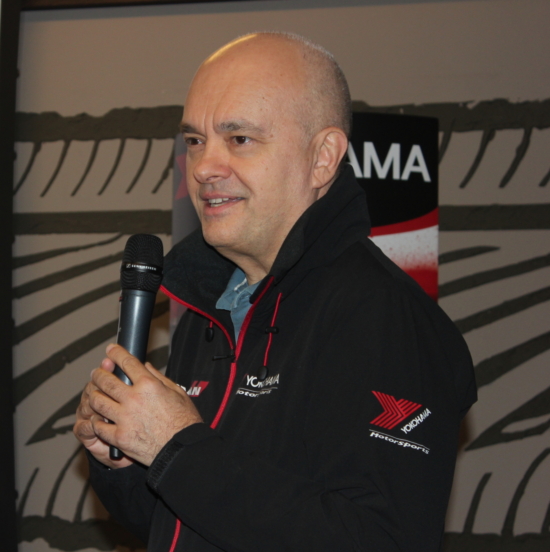New Yokohama Europe tyre factory could be built alongside a Yokohama TWS plant
 Yokohama Europe CEO, Gregorio Borgo, introduced proceedings by presenting an update on Yokohama’s performance and the strategy behind recent developments (Photo: Chris Anthony/Tyre Industry Publications Ltd)
Yokohama Europe CEO, Gregorio Borgo, introduced proceedings by presenting an update on Yokohama’s performance and the strategy behind recent developments (Photo: Chris Anthony/Tyre Industry Publications Ltd)
Roughly a year ago, then relatively-newly appointed Yokohama Europe president Gregorio Borgo, told us that the company has plans to invest in a factory “at the heart of Europe”. 12 months on, Tyres & Accessories once again spoke with Gregorio Borgo as well as Yokohama Europe chairman Hiroyuki Shiori in order to find out how the company’s growth and its interconnected factory plans have been progressing.
“Soon I hope to tell you there is something in Europe. But we have to deserve it”, Borgo told journalists gathered at the Nurburgring for the launch of the Advan Sport EV V108. When we caught up in parallel with the event, the obvious question was: what must happen for the European operation to deserve such an investment? In short, Yokohama’s European operations much consider the economies of scale associated with making a factory viable. To boil a complex subject down to numbers, that means 5 million units a year of passenger car tyres. 3 million units, for example, is too small.
As we have seen, when Yokohama’s European top management introduced the subject of factory within this continent last year, they said it would be “at the heart of Europe”. Back then, the implication was that a greenfield site somewhere around Poland or the Czech Republic was being considered. Now, however, executives are considering the possible synergies associated with making any future Yokohama European car tyre factory investment in a brownfield position alongside an existing former-Trelleborg Wheel Systems (now Yokohama TWS) manufacturing operation.
Why Europe? As we can see from the latest product news, Yokohama executives are still keenly aware of Europe’s role in setting the trends in terms of original equipment development.
Announcement likely by the end of 2024
Of course, the next question is: how close is Yokohama Europe getting to achieving the necessary performance that will result in a factory investment? The answer: getting closer all the time.
The market (based on ETRMA figures) is down double-digit percentages, but Yokohama is growing strongly in Europe. One might ask: why compare growth based on ETRMA data when that data doesn’t represent all the sales in any European market and in some markets – such as the UK – as much as half of replacement tyre sales could originate from non-ETRMA factories? Because the ETRMA is the kind of market we are playing in, comes the answer. Indeed, the strategy has and continues to be to move from “volume to value”.
Yokohama Europe’s recent business performance is clearest seen in its latest financial performance. Specifically, turnover is expected to be up 57 per cent by the end of the year.
“We are growing units and profitability via mix improvement”, Hiroyuki Shiori explained, adding that Yokohama’s car and truck tyre strategies are not mass-market models. Currently, Yokohama occupies car tyre market share around 2 per cent in Europe – a figure that clearly needs to grow before the company’s Japan headquarters will approve investment in a factory.
Nevertheless, “Recent strong growth contrasts clearly with the flat growth of previous years” and the headquarters are said to be “watching carefully”.
On the subject of truck tyre sales, that area is said to be growing in certain key European markets – namely the UK and France. In order to serve such growing demand, Yokohama’s Japan and US truck tyre plants are increasing their output and it is clear that talk of a European factory is currently only related to the passenger car tyre sector.
Back to car tyres, the volume-to-value strategy is also being driven by a personnel overhaul across the various national operations around Europe. As we have seen, this meant a new team in the UK, but similar changes have been made in the other markets. Asked whether any particular markets stand out within the overall strong European sales performance, the Eastern European operation is said to be “flying”.
So how close is the European operation to getting a – probably brownfield – car tyre factory investment approved? If things carry at their current strong rate, a decision is likely to be made by the end of 2024.

 Wheely Safe
Wheely Safe


Comments